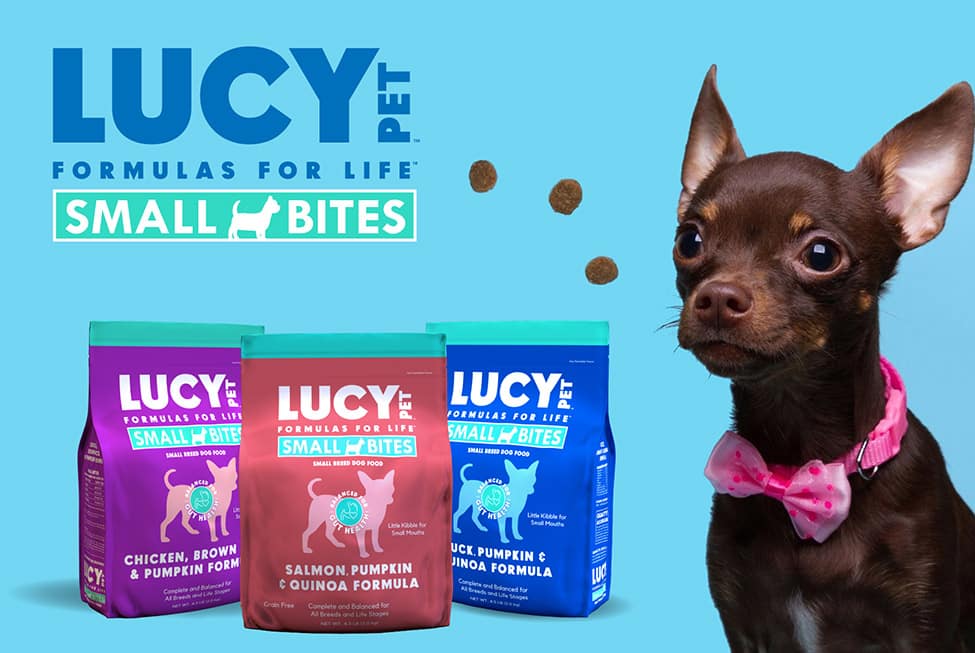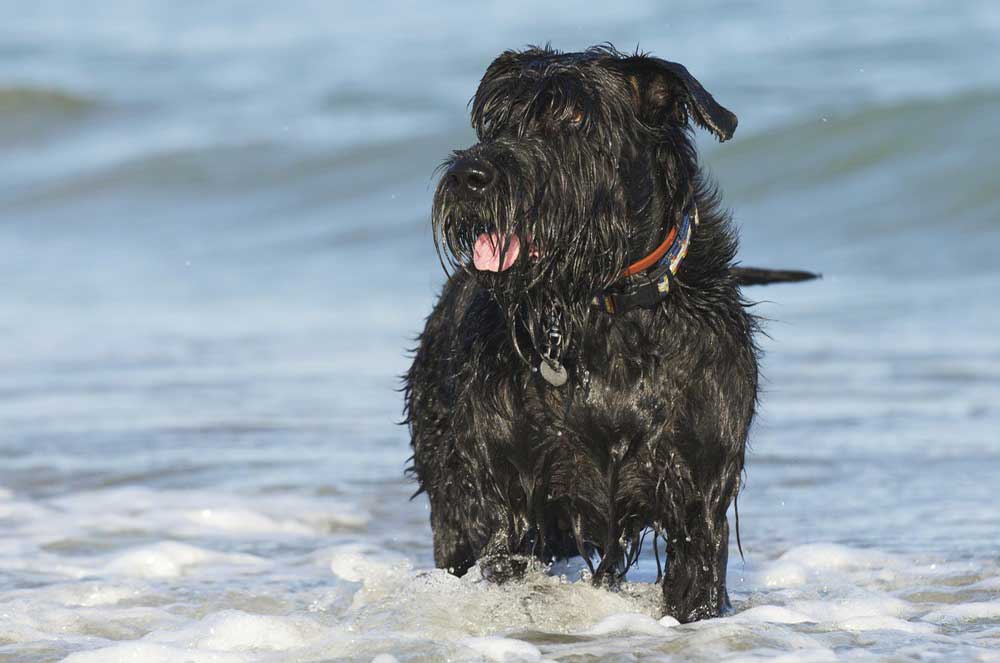
As the mustache crowd will boldly tell you: “This is what awesome looks like.” And if you have a schnauzer, you know this is what he’s saying to you every time he looks at you: for the word, Schnauzer means “snout,” or in colloquial German “moustache.”
Let’s look at a bit of the history and constitution of these smart, affectionate working dogs and give you some tips on a tip-top diet for your lively little mustached friend. Stay tuned to learn about the best dog food for a standard Schnauzer, as well as some interesting background facts about this breed type.
German Engineering at Its Best
Nimble livestock herder, vigilant pest control, feisty family guard, affectionate companion—the Schnauzer was one of Germany’s most useful working breeds in the middle ages through World War I. This strong-willed, yet playful breed is known for their intelligence and their amiable, affectionate nature.
The standard Schnauzer is a robust and healthy breed in general; but like every breed, Schnauzer’s do have some genetic predispositions to certain illnesses. A few of these weak links in the health of the Schnauzer are centered on the digestive system. We’re going to look at these conditions as specifically related to diet—how you can avoid digestive issues by choosing the best food for a Schnauzer.
What to Watch For
Now, this next section is just an overview of the predispositions of the Standard Schnauzer breed’s possible health issues. Read it only as a cautionary tale of what could happen if you’re not vigilant with their diet and not as issues your dog is necessarily doomed to face. Knowing the genetics of the Standard Schnauzer breed will hopefully enlighten you and help you to be proactive regarding your dog’s diet.
Hyperlipidemia
Standard Schnauzers are very likely to develop hyperlipidemia, which is elevated levels of bad cholesterol, or fat, in their blood. Lipid disorders, however, can be controlled by diet for the most part. We all know it’s never a good idea to feed your dog table scraps, but even more so in the case of Schnauzers.
Because of their predisposition to high blood fat, you need to be hyper-vigilant to never feed them your food. From the extra pat of butter, you added to dinner, to the oil in the popcorn of your late-night snack—hidden fats are in almost every facet of our diet, for better or for worse. And though your healthy constitution can easily process and excrete these fats, your Schnauzer cannot.
Pancreatitis
A Schnauzer’s proclivity to elevated blood fat can sometimes lead to pancreatitis. The main function of the pancreas is to produce and secrete insulin and digestive enzymes. And when high-fat food is ingested by your dog, the pancreas goes into a sort of overdrive: instead of releasing and activating the digestive enzymes into the small intestine, the enzymes instead become active in the pancreas.
If your Schnauzer has eaten (accidentally or otherwise) fatty foods, look for these common symptoms of pancreatitis:
- Diarrhea
- Vomiting
- Lethargy
- Restlessness
- Unusual posture or arching of the back
- Swollen abdomen
For mild cases, pancreatitis can often be rectified by the proper low-fat diet, plenty of fluids, and perhaps pain-management medication.
Liver Problems
And the not-so-hidden dangers of fat continues! In a terrible cascade effect, your standard Schnauzers are more likely than other breeds to have liver problems—yes, you guessed it—also owing to their hyperlipidemia. Because the liver is integral to digestion and fat-processing, any excess fat can tax your Schnauzer’s liver beyond what it can handle.
Hip Dysplasia
So your playful, always-ready-for-action workhorse of a Schnauzer loves to exercise and playtime? In so many ways, that is great for your dog’s health and overall well-being. Unfortunately, it is not so great for their joints as they grow older.
Hip dysplasia, a genetic disease that plagues many purebred large and medium dogs, is a gradual deterioration of the joint structure, muscles, connective tissues, and ligaments of the hip sockets.
In standard Schnauzers, hip dysplasia can develop even in dogs born with normal hips. Age and excessive wear-and-tear, due to exercise, can slowly lead to abnormalities in the hip joint. But the encouraging news is that your dog’s diet can have a huge impact on whether or not they will develop this disease later in life.
Dental Issues
Because Schnauzers have compact jaws, the teeth tend to be a bit crowded. This puts your dog at a bit of a higher risk for dental disease due to the higher rate of plaque buildup from leftover food particles. Dental issues may seem like a small thing, but they can lead to greater health problems such as:
- Systemwide inflammation and a taxed immune response
- Diabetes from improper sugar metabolization which has been linked to gum disease
- Blood disorders such as sepsis due to bacteria entering the bloodstream
- Heart disease stemming from plaque (yes, plaque on the gum line can make its way to your dog’s heart)
Besides normal brushing sessions, you can greatly improve your Schnauzer’s dental health by making sure he’s eating crunchy, dry kibble and not soft, canned food. A high-quality dry kibble will not only contain nutrients and enzymes to break down plaque on the teeth but also will prevent plaque from forming in the first place.
What’s in Their Bowl?
If you’ve thus far been discouraged by the possible—not probable—health problems associated with your beloved furry family member, don’t be! To be forewarned is to be forearmed. And we are about to arm you with how to prevent these issues nutritionally.
That’s right: to say “you are what you eat” is in no way an overstatement of fact. And just like you, your loved pet can overcome (and even bypass) the above-mentioned predispositions with a healthy, balanced diet.
So, what exactly does that look like for your dog?
Carbohydrates and Fiber
Carbohydrates are the main energy source for your Schnauzer’s active temperament. And feeding them nutrient-dense carbohydrate sources is vital to bolstering their immune system and ensuring their overall health.
Because of the growing number of dog allergies, look for grain-free dry dog food. By eliminating corn, wheat, or soy products in your dog’s food, you can be sure that his carbohydrates are from healthy vegetable sources. Look for ingredients such as:
- Potatoes, sweet potatoes, yams
- Peas
- Carrots
- Pumpkin
- Quinoa, barley, oats, brown rice
High-quality carbohydrate sources will also provide your dog with the optimum amount of healthy fibers. And why is fiber so very important to your Schnauzer’s diet? Fiber helps to trap and flush excess fat out of your dog’s system, which will keep their blood lipids at a healthy level.
Prebiotics
Speaking of fiber… let’s meet your Schnauzer’s new fibrous best friend: prebiotics. We’ve all heard of probiotics and may have already hopped on the supplemental bandwagon. But what exactly are prebiotics? Well, the suffix “pre” means “before”; so in its most basic framework, prebiotics comes before probiotics.
For your dog—just as for you—prebiotics ensure gut health and thereby bolster the immune system. Did you know that your dog’s gut is the key to 70%-80% of their immune system? When prebiotics are present, probiotics can thrive and keep the bacterial balance in check. More good bacteria equals less bad bacterial: and robust good bacteria leads to a healthy immune system and a healthy pooch!
A good—no a great—dog food will include valuable sources of prebiotic fibers such as these ingredients:
- Quinoa
- Flaxseed
- Dried Kelp
- Chicory Root
- Pumpkin
In short: a healthier gut and bountiful beneficial bacteria will aid in optimum digestion, which means that your Schnauzer will be better able to absorb and utilize the nutrients in his meal.
Healthy Fats
Just as in humans, healthy fats will keep the bad fats (triglycerides) from building up in your Schnauzer’s bloodstream. Healthy fats allow the metabolization of vitamins A, D, E, and K; they are integral to their skin and hypoallergenic coat health and are a vital energy source for your playful Schnauzer.
Opt for these sources of fats when scouring labels of dog food brands:
- Vitamin E from natural sources such as eggs, salmon, trout, or sunflower oil
- Omega 3s from fish oils or flaxseeds
- Omega 6s from pork, poultry, or duck fat and sunflower oil
High-Quality Protein Sources
Despite his penchant for naptime, your Schnauzer is a working breed and is a solid muscle-bound dog; and his dense little body needs high-quality protein sources to thrive. The best dog food for Schnauzer will contain roughly 18%-25% protein from whole animal sources like meat, poultry, or fish.
Meet Lucy
Want a precisely formulated, scientifically-backed nutritional powerhouse to keep your Schnauzer free from even their genetically-predisposed illnesses? Want high-quality dog food for your Schnauzer made from responsibly sourced US, French, and Alaskan protein? Want food with P.B.F Prebiotic Balanced Fiber ™ blend and whole, main ingredients such as quinoa, pumpkin, and chickpeas?
Always committed to your pet, always committed to quality—Lucy Pet Formulas for Life is exactly that: a perfect mixture of optimum nutrition for your Schnauzer, in every stage of their lives.
Sources:
Merck Veterinary Manual. Disorders of the Liver and Gallbladder in Dogs. https://www.merckvetmanual.com/dog-owners/digestive-disorders-of-dogs/disorders-of-the-liver-and-gallbladder-in-dogs
Lucy Pet. Why Gut Health? https://www.lucypetproducts.com/p-b-f-prebiotic-balanced-fiber
Lucy Pet. The Lucy Pet Formulas for Life™ Solution. https://www.lucypetproducts.com/formulas-for-life
AKC. Hip Dysplasia in Dogs. https://www.akc.org/expert-advice/health/hip-dysplasia-in-dogs/
Lucy Pet. 8 Reasons Lucy Pet Food Is the Best. https://www.lucypetproducts.com/blog/8-reasons-lucy-pet-food-is-the-best
Interesting Facts About Schnauzers. https://www.lucypetproducts.com/blog/10-interesting-facts-about-schnauzers
6 Common Schnauzer Health Problems. https://www.lucypetproducts.com/blog/6-common-schnauzer-health-problems
Are Schnauzers Hypoallergenic?. https://www.lucypetproducts.com/blog/are-schnauzers-hypoallergenic






Leave A Comment
You must be logged in to post a comment.